Charles E W Bean, Diaries, AWM38 3DRL 606/261/1 - 1929 - 1930 - Part 13
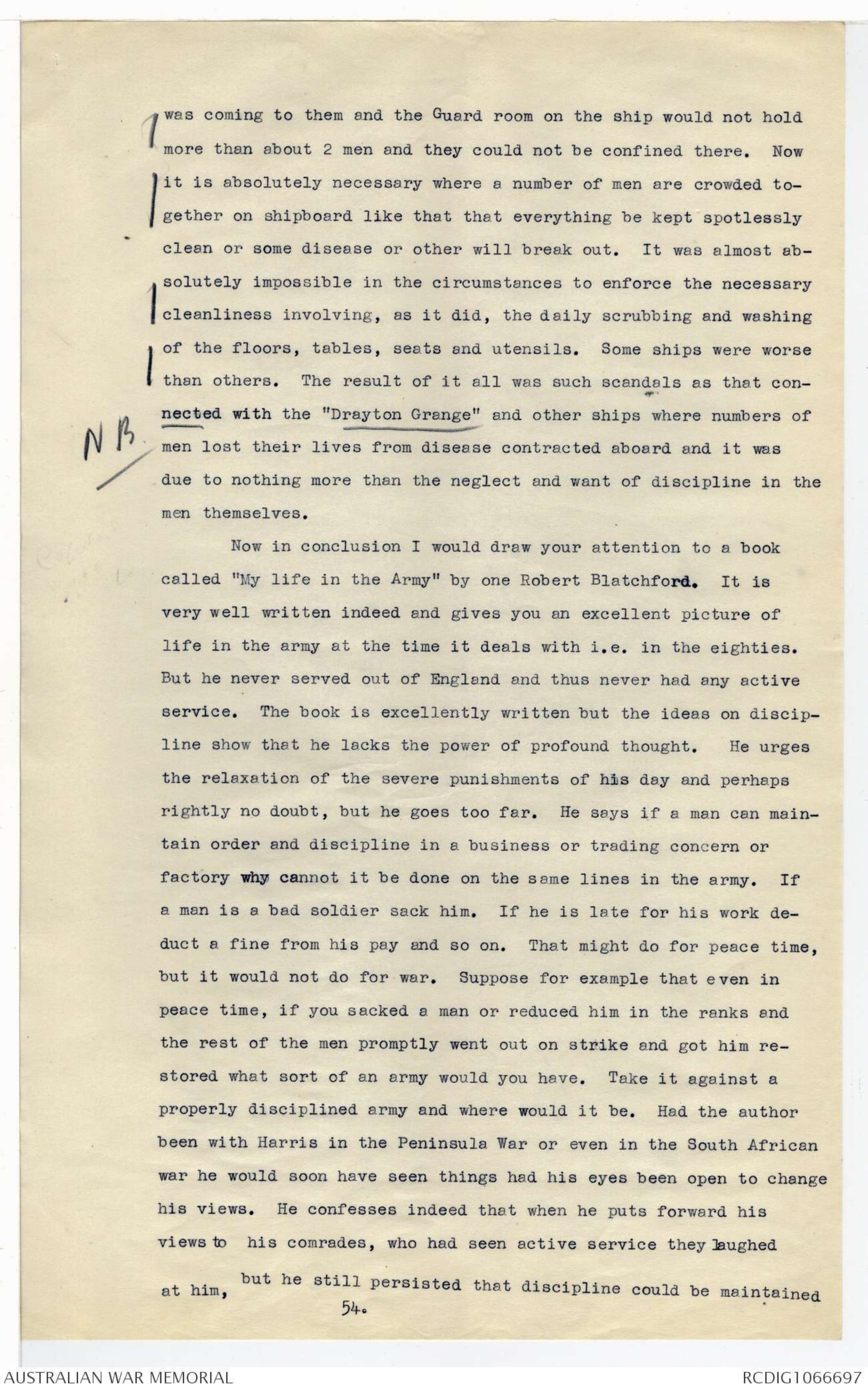
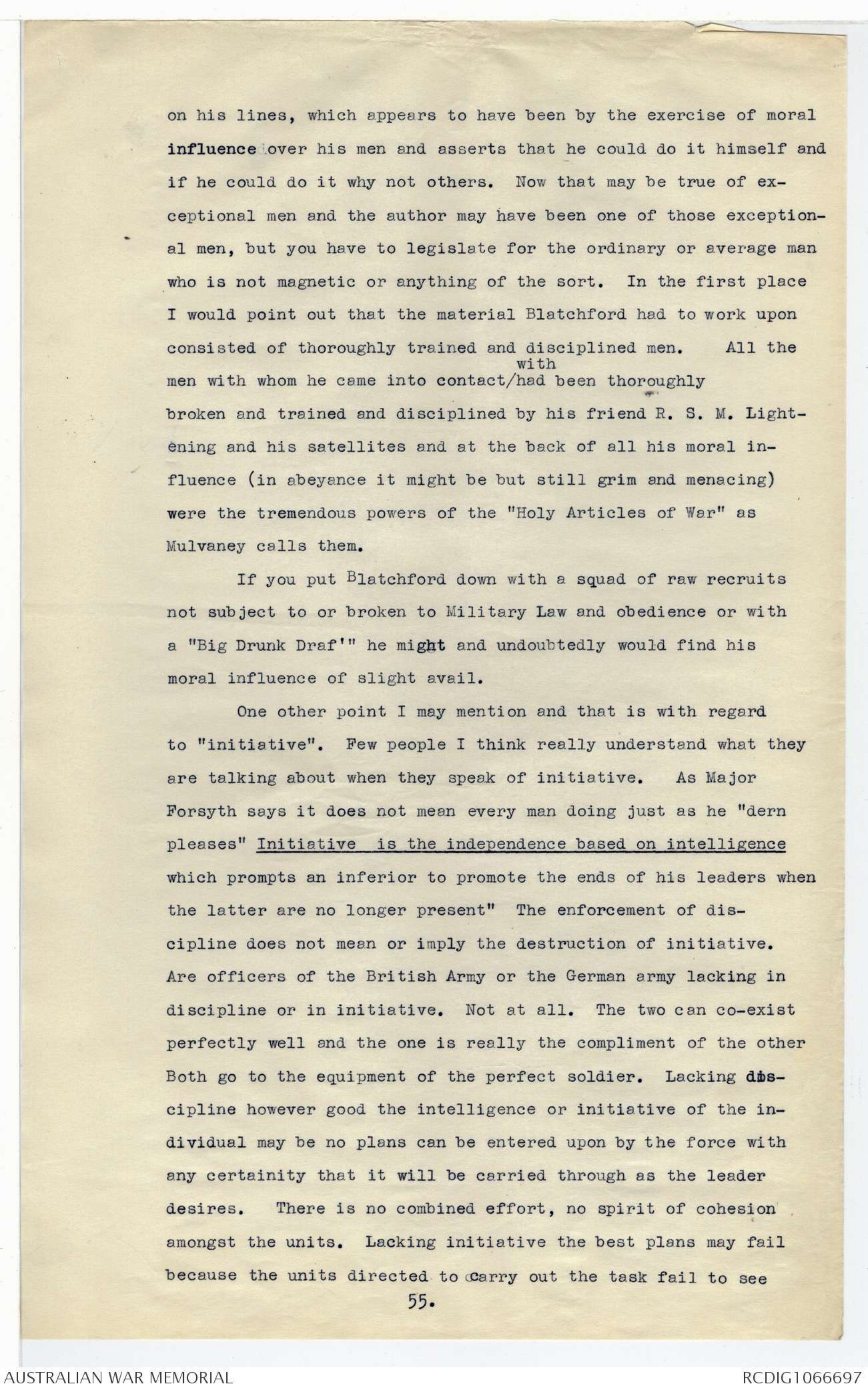
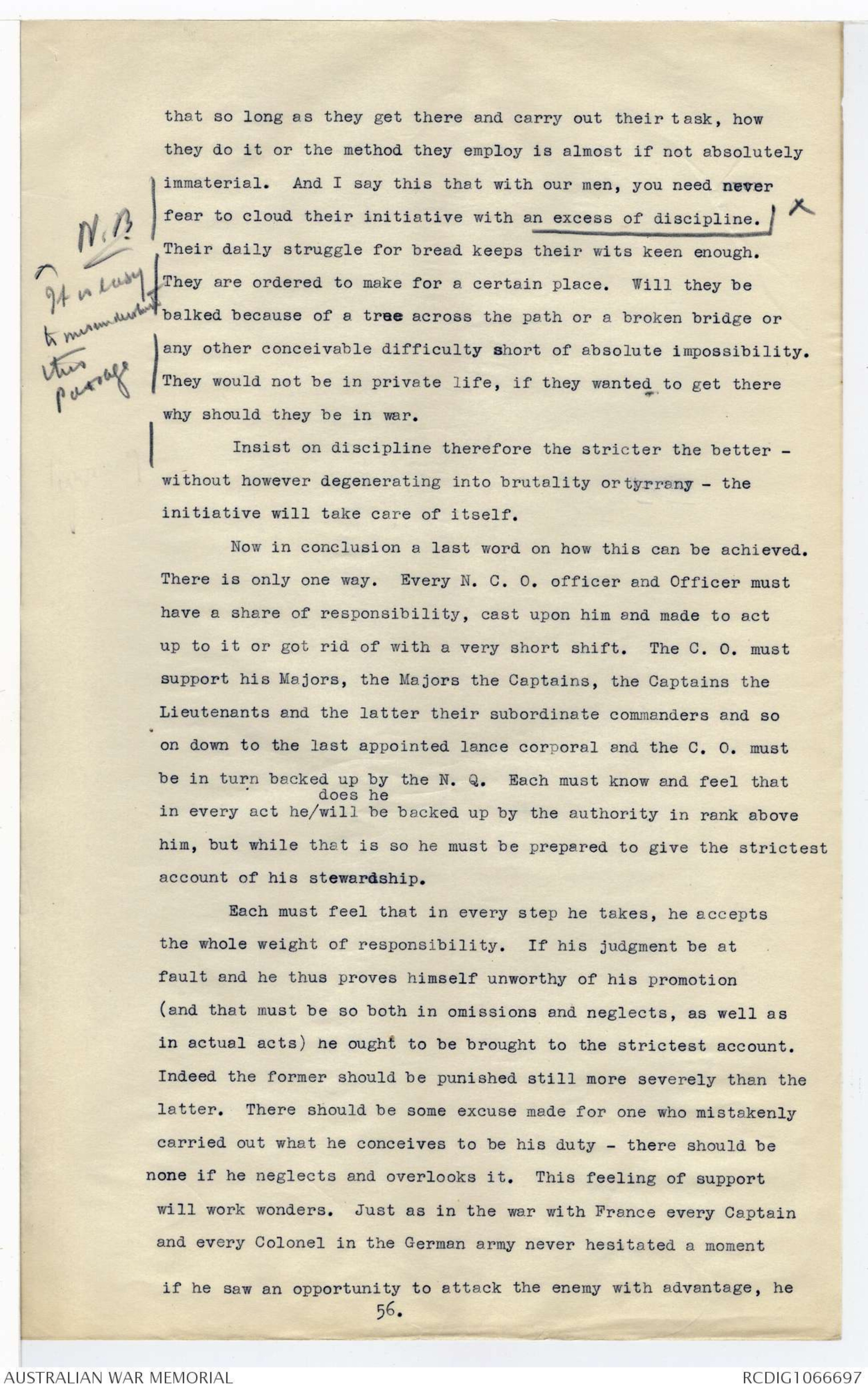
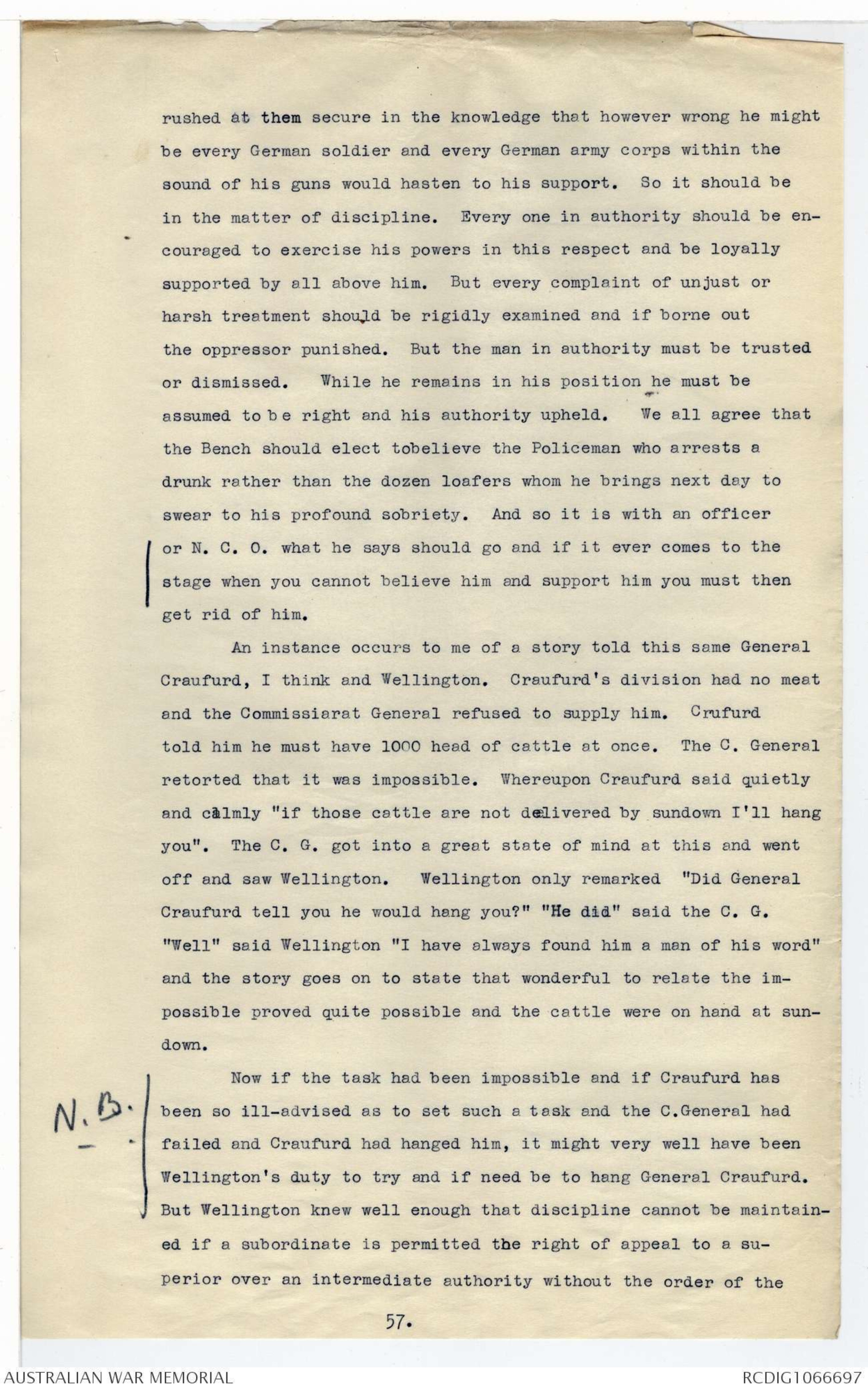
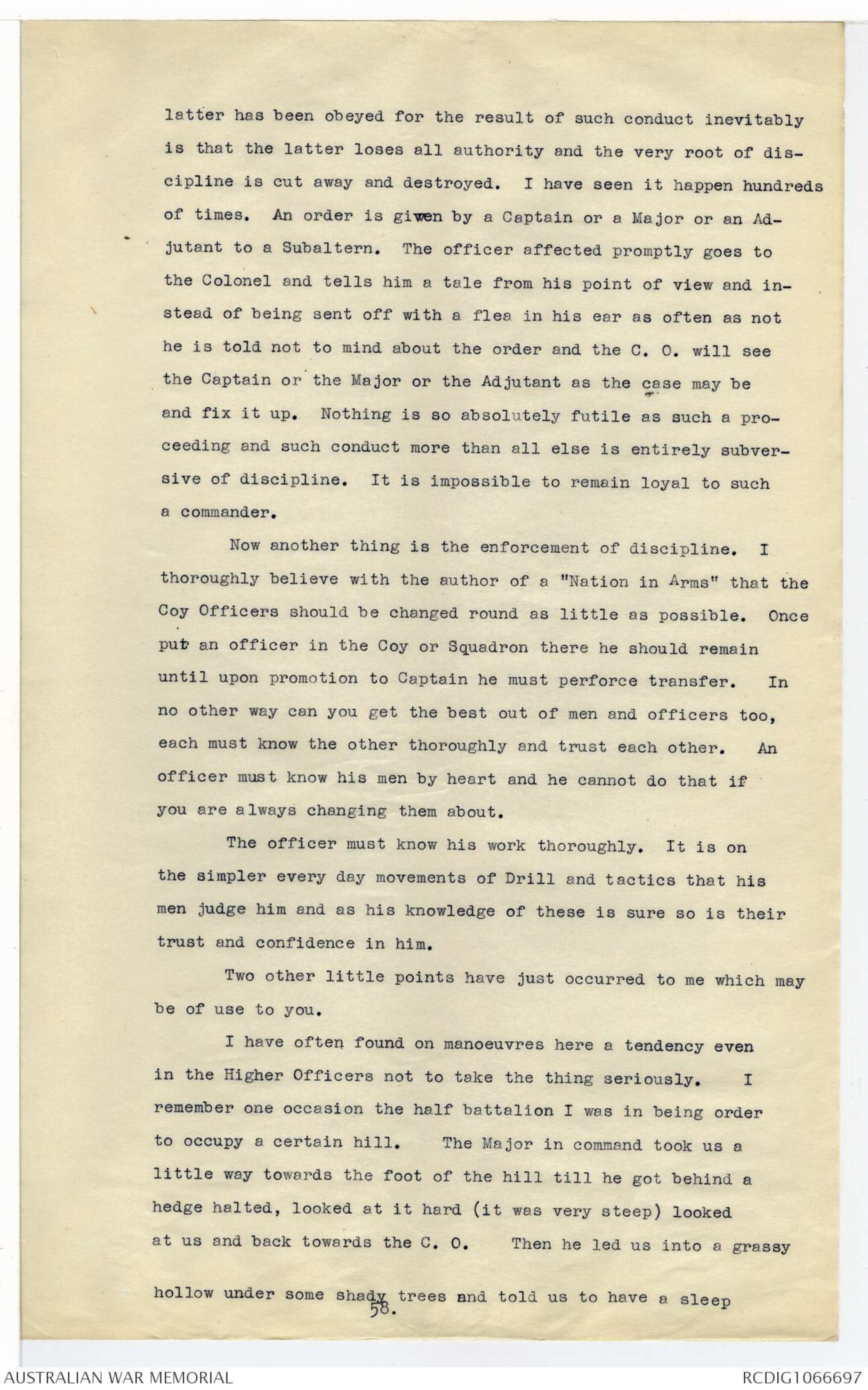
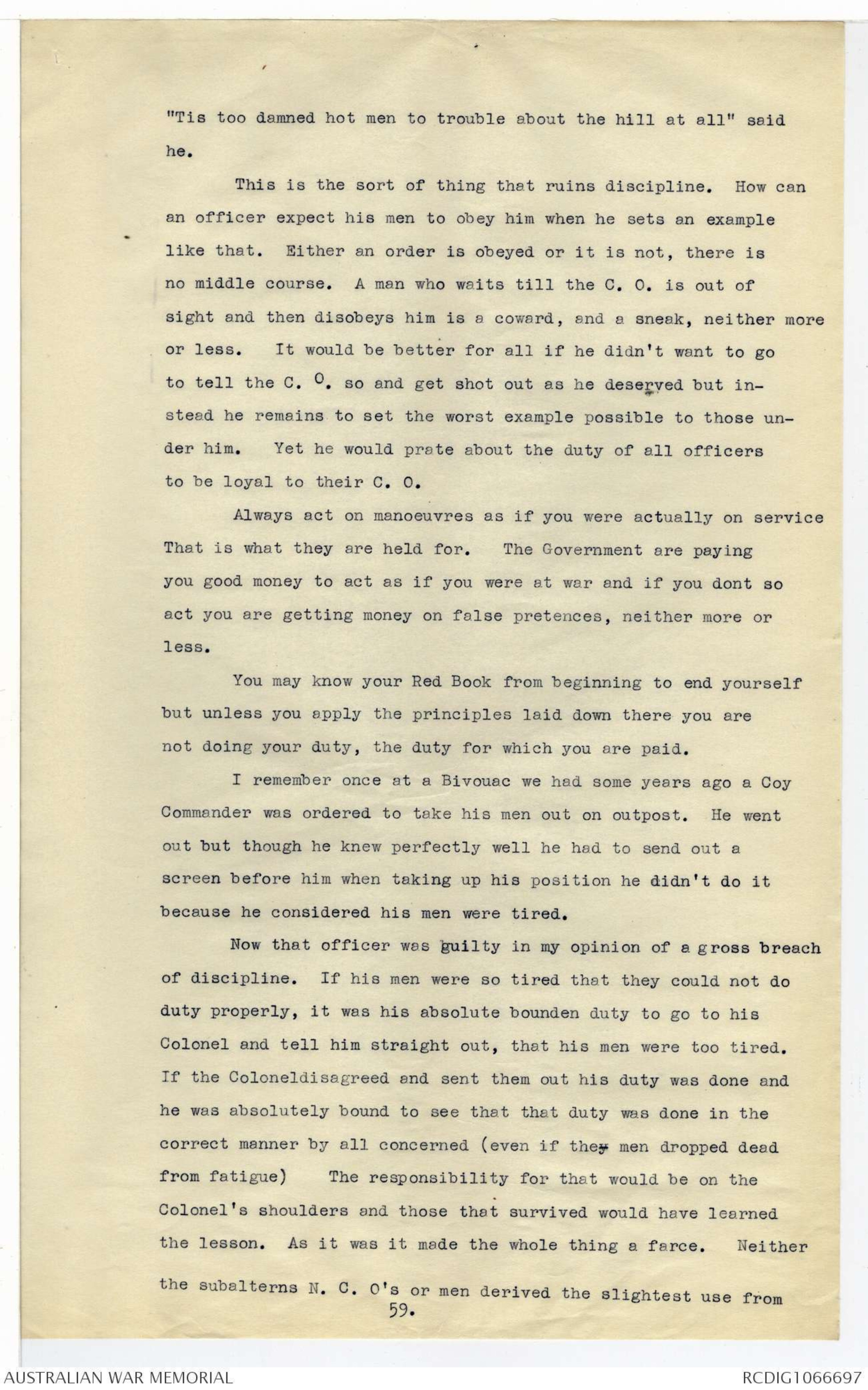
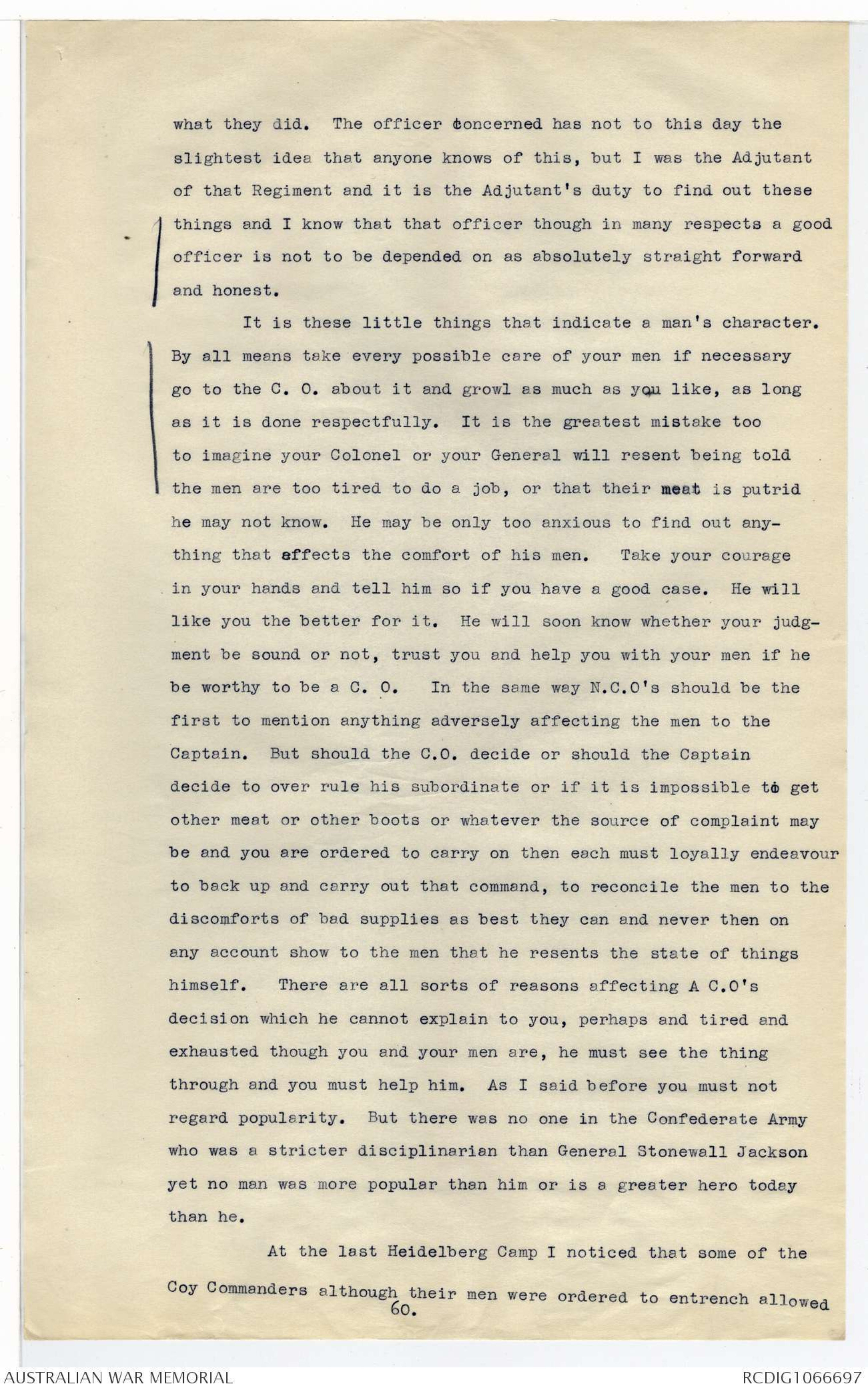
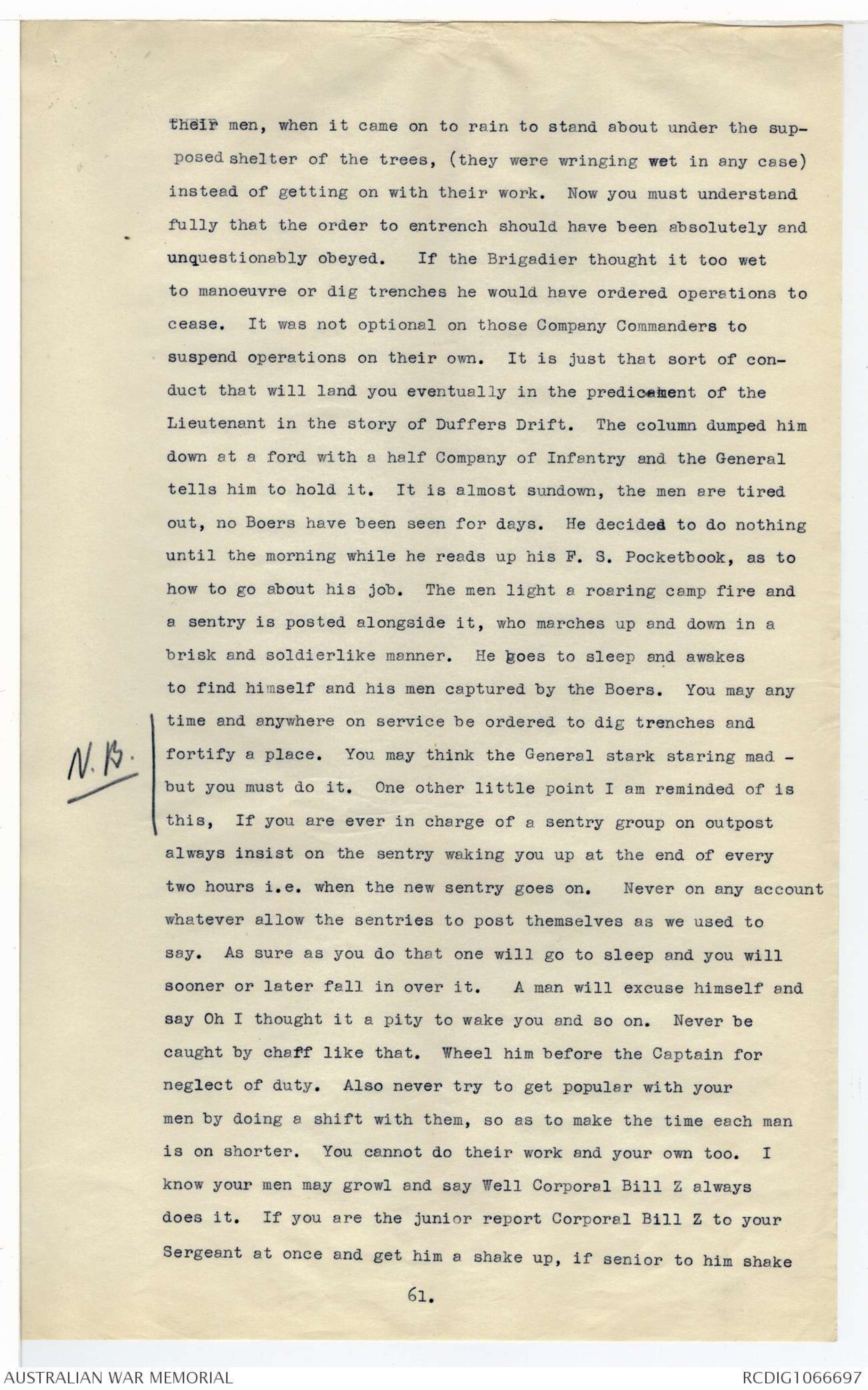
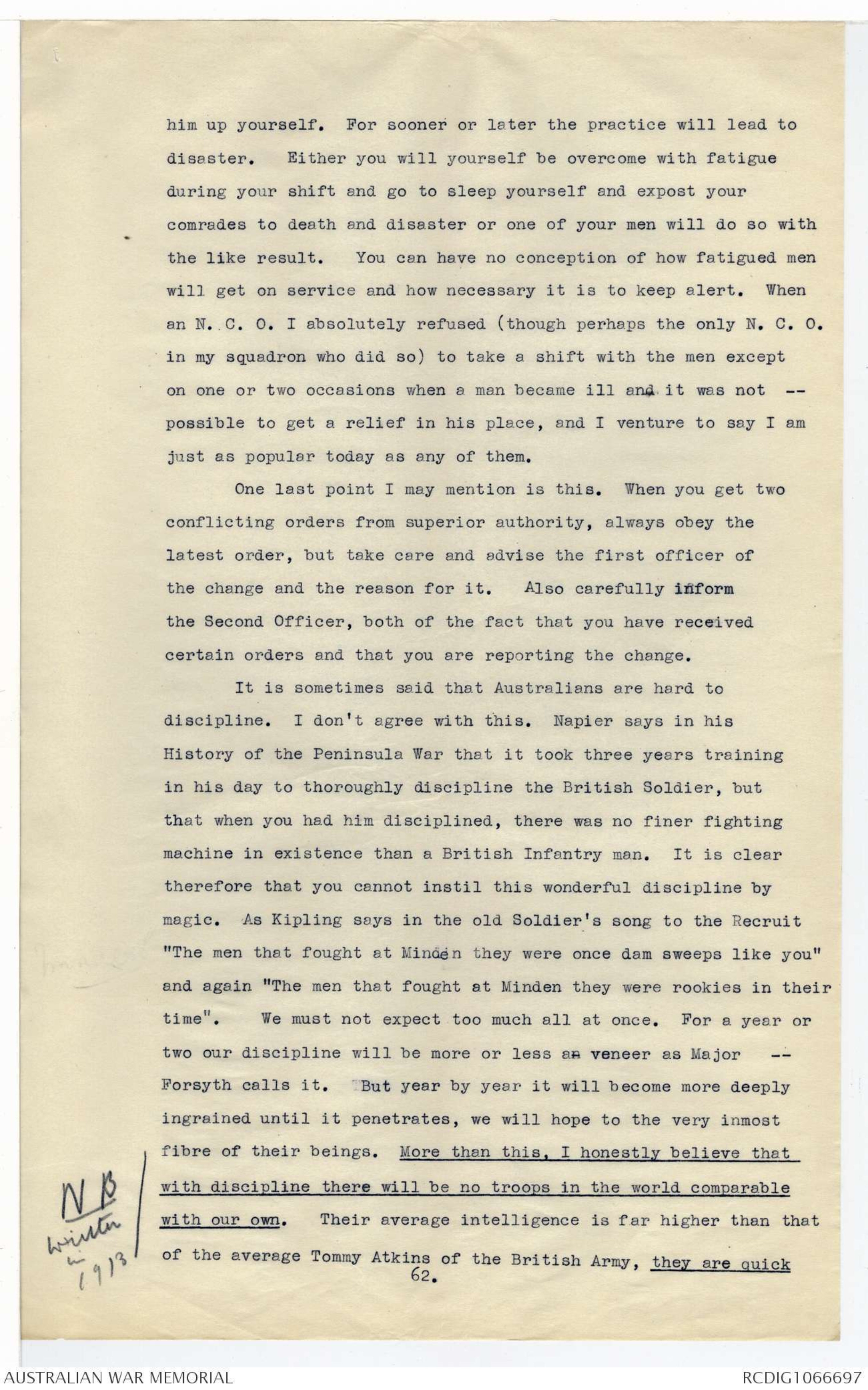
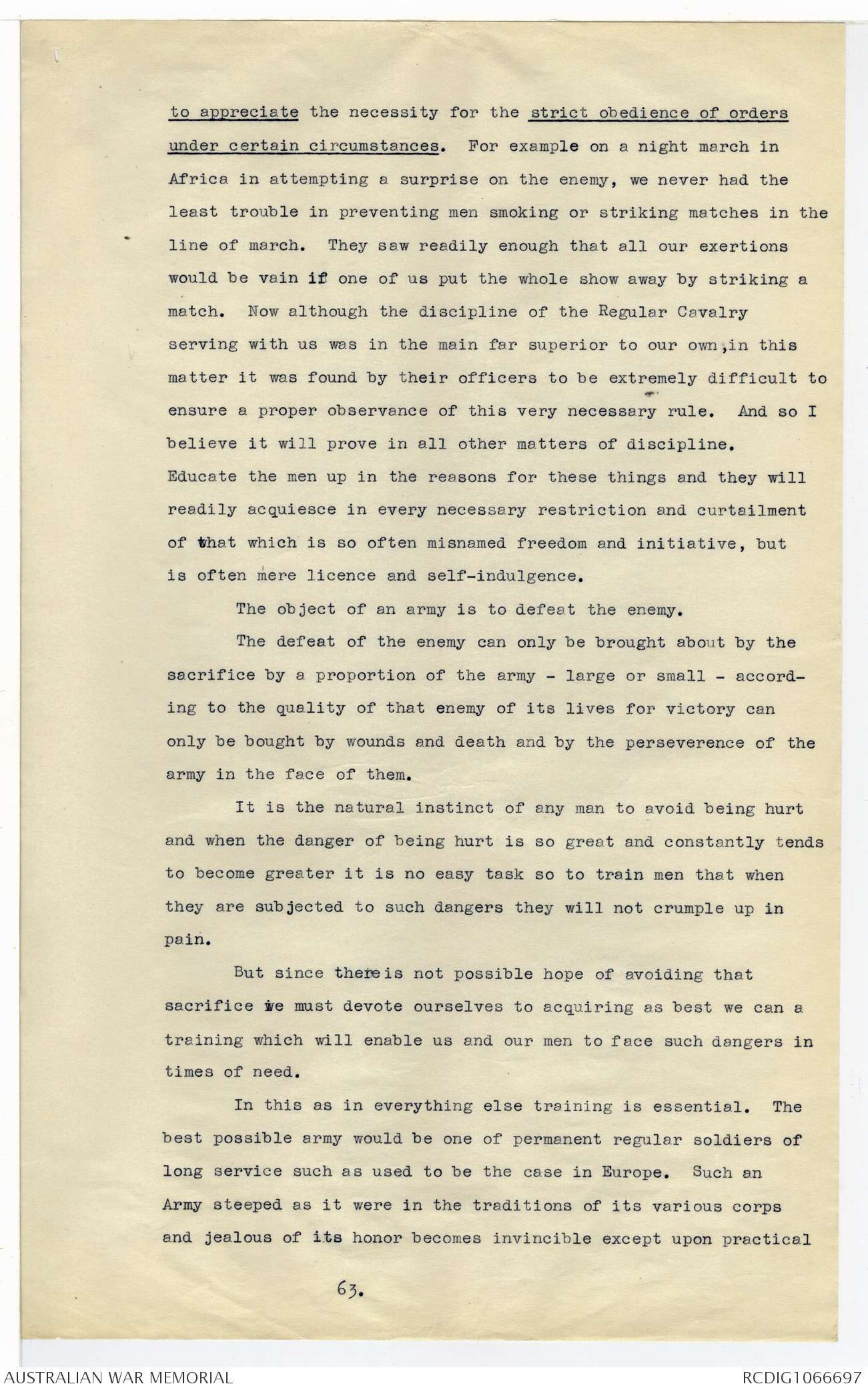
was coming to them and the Guard room on the ship would not hold
more than about 2 men and they could not be confined there. Now
it is absolutely necessary where a number of men are crowded together
on shipboard like that that everything be kept spotlessly
clean or some disease or other will break out. It was almost absolutely
impossible in the circumstances to enforce the necessary
cleanliness involving, as it did, the daily scrubbing and washing
of the floors, tables, seats and utensils. Some ships were worse
than others. The result of it all was such scandals as that connected
[*NB.*]
with the "Drayton Grange" and other ships where numbers of
men lost their lives from disease contracted aboard and it was
due to nothing more than the neglect and want of discipline in the
men themselves.
Now in conclusion I would draw your attention to a book
called "My Life in the Army" by one Robert Blatchford. It is
very well written indeed and gives you an excellent picture of
life in the army at the time it deals with i.e. in the eighties.
But he never served out of England and thus never had any active
service. The book is excellently written but the ideas on discipline
show that he lacks the power of profound thought. He urges
the relaxation of the severe punishments of his day and perhaps
rightly no doubt, but he goes too far. He says if a man can maintain
order and discipline in a business or trading concern or
factory why cannot it be done on the same lines in the army. If
a man is a bad soldier sack him. If he is late for his work deduct
a fine from his pay and so on. That might do for peace time,
but it would not do for war. Suppose for example that even in
peace time, if you sacked a man or reduced him in the ranks and
the rest of the men promptly went out on strike and got him restored
what sort of an army would you have. Take it against a
properly disciplined army and where would it be. Had the author
been with Harris in the Peninsula War or even in the South African
war he would soon have seen things had his eyes been open to change
his views. He confesses indeed that when he puts forward his
views to his comrades, who had seen active service they laughed
at him, but he still persisted that discipline could be maintained
54.
on his lines, which appears to have been by the exercise of moral
influence over his men and asserts that he could do it himself and
if he could do it why not others. Now that may be true of exceptional
men and the author may have been one of those exceptional
men, but you have to legislate for the ordinary or average man
who is not magnetic or anything of the sort. In the first place
I would point out that the material Blatchford had to work upon
consisted of thoroughly trained and disciplined men. All the
men with whom he came into contact ^with had been thoroughly
broken and trained and disciplined by his friend R. S. M. Lightening
and his satellites and at the back of all his moral influence
(in abeyance it might be but still grim and menacing)
were the tremendous powers of the "Holy Articles of War" as
Mulvaney calls them.
If you put Blatchford down with a squad of raw recruits
not subject to or broken to Military Law and obedience or with
a "Big Drunk Draf'" he might and undoubtedly would find his
moral influence of slight avail.
One other point I may mention and that is with regard
to "initiative". Few people I think really understand what they
are talking about when they speak of initiative. As Major
Forsyth says it does not mean every man doing just as he "dern
pleases" Initiative is the independence based on intelligence
which prompts an inferior to promote the ends of his leaders when
the latter are no longer present" The enforcement of discipline
does not mean or imply the destruction of initiative.
Are officers of the British Army or the German army lacking in
discipline or in initiative. Not at all. The two can co-exist
perfectly well and the one is really the compliment of the other
Both go to the equipment of the perfect soldier. Lacking discipline
however good the intelligence or initiative of the individual
may be no plans can be entered upon by the force with
any certainty that it will be carried through as the leader
desires. There is no combined effort, no spirit of cohesion
amongst the units. Lacking initiative the best plan may fail
because the units directed to carry out the task fail to see
55.
that so long as they get there and carry out their task, how
they do it or the method they employ is almost if not absolutely
immaterial. And I say this that with our men, you need never
fear to cloud their initiative with an excess of discipline. x
[*N.B.
x It is easy
to misunderstand]
this passage*]
Their daily struggle for bread keeps their wits keen enough.
They are ordered to make for a certain place. Will they be
balked because of a tree across the path or a broken bridge or
any other conceivable difficulty short of absolute impossibility.
They would not be in private life, if they wanted to get there
why should they be in war.
Insist on discipline therefore the stricter the better -
without however degenerating into brutality or tyrrany - the
initiative will take care of itself.
Now in conclusion a last word on how this can be achieved.
There is only one way. Every N. C. O. officer and Officer must
have a share of responsibility, cast upon him and made to act
up to it or got rid of with a very short shift. The C. O. must
support his Majors, the Majors the Captains, the Captains the
Lieutenants and the latter their subordinate commanders and so
on down to the last appointed lance corporal and the C. O. must
be in turn backed up by the N. Q. Each must know and feel that
in every act he ^does he will be backed up by the authority in rank above
him, but while that is so he must be prepared to give the strictest
account of his stewardship.
Each must feel that in every step he takes, he accepts
the whole weight of responsibility. If his judgment be at
fault and he thus proves himself unworthy of his promotion
(and that must be so both in omissions and neglects, as well as
in actual acts) he ought to be brought to the strictest account.
Indeed the former should be punished still more severely than the
latter. There should be some excuse made for one who mistakenly
carried out what he conceives to be his duty - there should be
none if he neglects and overlooks it. This feeling of support
will work wonders. Just as in the war with France every Captain
and every Colonel in the German army never hesitated a moment
if he saw an opportunity to attack the enemy with advantage, he
56.
rushed at them secure in the knowledge that however wrong he might
be every German soldier and every German army corps within the
sound of his guns would hasten to his support. So it should be
in the matter of discipline. Every one in authority should be encouraged
to exercise his powers in this respect and be loyally
supported by all above him. But every complaint of unjust or
harsh treatment should be rigidly examined and if borne out
the oppressor punished. But the man in authority must be trusted
or dismissed. While he remains in his position he must be
assumed to be right and his authority upheld. We all agree that
the Bench should elect to believe the Policeman who arrests a
drunk rather than the dozen loafers whom he brings next day to
swear to his profound sobriety. And so it is with an officer
or N. C. O. what he says should go and if it ever comes to the
stage when you cannot believe him and support him you must then
get rid of him.
An instance occurs to me of a story told this same General
Craufurd, I think and Wellington. Craufurd's division had no meat
and the Commissiarat General refused to supply him. Crufurd
told him he must have 1000 head of cattle at once. The C. General
retorted that it was impossible. Whereupon Craufurd said quietly
and calmly "if those cattle are not delivered by sundown I'll hang
you". The C. G. got into a great state of mind at this and went
off and saw Wellington. Wellington only remarked "Did General
Craufurd tell you he would hang you?” "He did" said the C. G.
"Well" said Wellington "I have always found him a man of his word"
and the story goes on to state that wonderful to relate the impossible
proved quite possible and the cattle were on hand at sundown.
[*N.B.*]
Now if the task had been impossible and if Craufurd has
been so ill-advised as to set such a task and the C.General had
failed and Craufurd had hanged him, it might very well have been
Wellington's duty to try and if need be to hang General Craufurd.
But Wellington knew well enough that discipline cannot be maintained
if a subordinate is permitted the right of appeal to a superior
over an intermediate authority without the order of the
57.
latter has been obeyed for the result of such conduct inevitably
is that the latter loses all authority and the very root of discipline
is cut away and destroyed. I have seen it happen hundreds
of times. An order is given by a Captain or a Major or an Adjutant
to a Subaltern. The officer affected promptly goes to
the Colonel and tells him a tale from his point of view and instead
of being sent off with a flea in his ear as often as not
he is told not to mind about the order and the C. O. will see
the Captain or the Major or the Adjutant as the case may be
and fix it up. Nothing is so absolutely futile as such a proceeding
and such conduct more than all else is entirely subversive
of discipline. It is impossible to remain loyal to such
a commander.
Now another thing is the enforcement of discipline. I
thoroughly believe with the author of a "Nation in Arms" that the
Coy Officers should be changed round as little as possible. Once
put an officer in the Coy or Squadron there he should remain
until upon promotion to Captain he must perforce transfer. In
no other way can you get the best out of men and officers too,
each must know the other thoroughly and trust each other. An
officer must know his men by heart and he cannot do that if
you are always changing them about.
The officer must know his work thoroughly. It is on
the simpler every day movements of Drill and tactics that his
men judge him and as his knowledge of these is sure so is their
trust and confidence in him.
Two other little points have just occurred to me which may
be of use to you.
I have often found on manoeuvres here a tendency even
in the Higher Officers not to take the thing seriously. I
remember one occasion the half battalion I was in being order
to occupy a certain hill. The Major in command took us a
little way towards the foot of the hill till he got behind a
hedge halted, looked at it hard (it was very steep) looked
at us and back towards the C. O. Then he led us into a grassy
hollow under some shady trees and told us to have a sleep
58.
"Tis too damned hot men to trouble about the hill at all" said
he.
This is the sort of thing that ruins discipline. How can
an officer expect his men to obey him when he sets an example
like that. Either an order is obeyed or it is not, there is
no middle course. A man who waits till the C. O. is out of
sight and then disobeys him is a coward, and a sneak, neither more
or less. It would be better for all if he didn’t want to go
to tell the C. O. so and get shot out as he deserved but instead
he remains to set the worst example possible to those under
him. Yet he would prate about the duty of all officers
to be loyal to their C. O.
Always act on manoeuvres as if you were actually on service
That is what they are held for. The Government are paying
you good money to act as if you were at war and if you dont so
act you are getting money on false pretences, neither more or
less.
You may know your Red Book from beginning to end yourself
but unless you apply the principles laid down there you are
not doing your duty, the duty for which you are paid.
I remember once at a Bivouac we had some years ago a Coy
Commander was ordered to take his men out on outpost. He went
out but though he knew perfectly well he had to send out a
screen before him when taking up his position he didn’t do it
because he considered his men were tired.
Now that officer was guilty in my opinion of a gross breach
of discipline. If his men were so tired that they could not do
duty properly, it was his absolute bounden duty to go to his
Colonel and tell him straight out, that his men were too tired.
If the Colonel disagreed and sent them out his duty was done and
he was absolutely bound to see that that duty was done in the
correct manner by all concerned (even if they men dropped dead
from fatigue) The responsibility for that would be on the
Colonel's shoulders and those that survived would have learned
the lesson. As it was it made the whole thing a farce. Neither
the subalterns N. C. O's or men derived the slightest use from
59.
what they did. The officer concerned has not to this day the
slightest idea that anyone knows of this, but I was the Adjutant
of that Regiment and it is the Adjutant's duty to find out these
things and I know that that officer though in many respects a good
officer is not to be depended on as absolutely straight forward
and honest.
It is these little things that indicate a man's character.
By all means take every possible care of your men if necessary
go to the C. O. about it and growl as much as you like, as long
as it is done respectfully. It is the greatest mistake too
to imagine your Colonel or your General will resent being told
the men are too tired to do a job, or that their meat is putrid
he may not know. He may be only too anxious to find out anything
that affects the comfort of his men. Take your courage
in your hands and tell him so if you have a good case. He will
like you the better for it. He will soon know whether your judgment
be sound or not, trust you and help you with your men if he
be worthy to be a C. O. In the same way N.C.O's should be the
first to mention anything adversely affecting the men to the
Captain. But should the C.O. decide or should the Captain
decide to over rule his subordinate or if it is impossible to get
other meat or other boots or whatever the source of complaint may
be and you are ordered to carry on then each must loyally endeavour
to back up and carry out that command, to reconcile the men to the
discomforts of bad supplies as best they can and never then on
any account show to the men that he resents the state of things
himself. There are all sorts of reasons affecting A C.O's
decision which he cannot explain to you, perhaps and tired and
exhausted though you and your men are, he must see the thing
through and you must help him. As I said before you must not
regard popularity. But there was no one in the Confederate Army
who was a stricter disciplinarian than General Stonewall Jackson
yet no man was more popular than him or is a greater hero today
than he.
At the last Heidelberg Camp I noticed that some of the
Coy Commanders although their men were ordered to entrench allowed
60.
their men, when it came on to rain to stand about under the supposed
shelter of the trees, (they were wringing wet in any case)
instead of getting on with their work. Now you must understand
fully that the order to entrench should have been absolutely and
unquestionably obeyed. If the Brigadier thought it too wet
to manoeuvre or dig trenches he would have ordered operations to
cease. It was not optional on those Company Commanders to
suspend operations on their own. It is just that sort of conduct
that will land you eventually in the predicament of the
Lieutenant in the story of Duffers Drift. The column dumped him
down at a ford with a half Company of Infantry and the General
tells him to hold it. It is almost sundown, the men are tired
out, no Boers have been seen for days. He decides to do nothing
until the morning while he reads up his F. S. Pocketbook, as to
how to go about his job. The men light a roaring camp fire and
a sentry is posted alongside it, who marches up and down in a
brisk and soldierlike manner. He goes to sleep and awakes
to find himself and his men captured by the Boers. You may any
time and anywhere on service be ordered to dig trenches and
[*N.B.*]
fortify a place. You may think the General stark staring mad -
but you must do it. One other little point I am reminded of is
this, If you are ever in charge of a sentry group on outpost
always insist on the sentry waking you up at the end of every
two hours i.e. when the new sentry goes on. Never on any account
whatever allow the sentries to post themselves as we used to
say. As sure as you do that one will go to sleep and you will
sooner or later fall in over it. A man will excuse himself and
say Oh I thought it a pity to wake you and so on. Never be
caught by chaff like that. Wheel him before the Captain for
neglect of duty. Also never try to get popular with your
men by doing a shift with them, so as to make the time each man
is on shorter. You cannot do their work and your own too. I
know your men may growl and say Well Corporal Bill Z always
does it. If you are the junior report Corporal Bill Z to your
Sergeant at once and get him a shake up, if senior to him shake
61.
him up yourself. For sooner or later the practice will lead to
disaster. Either you will yourself be overcome with fatigue
during your shift and go to sleep yourself and expost your
comrades to death and disaster or one of your men will do so with
the like result. You can have no conception of how fatigued men
will get on service and how necessary it is to keep alert. When
an N. C. O. I absolutely refused (though perhaps the only N. C. O.
in my squadron who did so) to take a shift with the men except
on one or two occasions when a man became ill and it was not --
possible to get a relief in his place, and I venture to say I am
just as popular today as any of them.
One last point I may mention is this. When you get two
conflicting orders from superior authority, always obey the
latest order, but take care and advise the first officer of
the change and the reason for it. Also carefully inform
the Second Officer, both of the fact that you have received
certain orders and that you are reporting the change.
It is sometimes said that Australians are hard to
discipline. I don’t agree with this. Napier says in his
History of the Peninsula War that it took three years training
in his day to thoroughly discipline the British Soldier, but
that when you had him disciplined, there was no finer fighting
machine in existence than a British Infantry man. It is clear
therefore that you cannot instil this wonderful discipline by
magic. As Kipling says in the old Soldier's song to the Recruit
"The men that fought at Minden they were once dam sweeps like you"
and again "The men that fought at Minden they were rookies in their
time". We must not expect too much all at once. For a year or
two our discipline will be more or less an veneer as Major --
Forsyth calls it. But year by year it will become more deeply
ingrained until it penetrates, we will hope to the very inmost
fibre of their beings. More than this, I honestly believe that
[ *NB
written
in
1913*]
with discipline there will be no troops in the world comparable
with our own. Their average intelligence is far higher than that
of the average Tommy Atkins of the British Army, they are quick
62.
to appreciate the necessity for the strict obedience of orders
under certain circumstances. For example on a night march in
Africa in attempting a surprise on the enemy, we never had the
least trouble in preventing men smoking or striking matches in the
line of march. They saw readily enough that all our exertions
would be vain if one of us put the whole show away by striking a
match. Now although the discipline of the Regular Cavalry
serving with us was in the main far superior to our own, in this
matter it was found by their officers to be extremely difficult to
ensure a proper observance of this very necessary rule. And so I
believe it will prove in all other matters of discipline.
Educate the men up in the reasons for these things and they will
readily acquiesce in every necessary restriction and curtailment
of that which is so often misnamed freedom and initiative, but
is often mere licence and self-indulgence.
The object of an army is to defeat the enemy.
The defeat of the enemy can only be brought about by the
sacrifice by a proportion of the army - large or small - according
to the quality of that enemy of its lives for victory can
only be bought by wounds and death and by the perseverence of the
army in the face of them.
It is the natural instinct of any man to avoid being hurt
and when the danger of being hurt is so great and constantly tends
to become greater it is no easy task so to train men that when
they are subjected to such dangers they will not crumple up in
pain.
But since there is not possible hope of avoiding that
sacrifice we must devote ourselves to acquiring as best we can a
training which will enable us and our men to face such dangers in
times of need.
In this as in everything else training is essential. The
best possible army would be one of permanent regular soldiers of
long service such as used to be the case in Europe. Such an
Army steeped as it were in the traditions of its various corps
and jealous of its honor becomes invincible except upon practical
63.
 Deb Parkinson
Deb ParkinsonThis transcription item is now locked to you for editing. To release the lock either Save your changes or Cancel.
This lock will be automatically released after 60 minutes of inactivity.